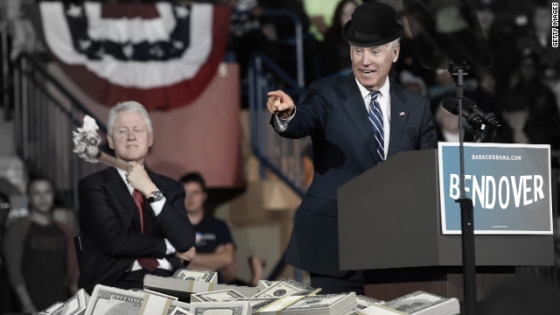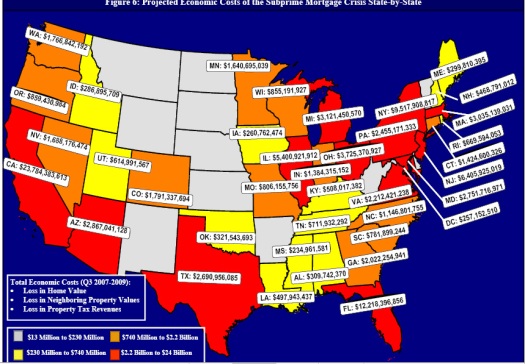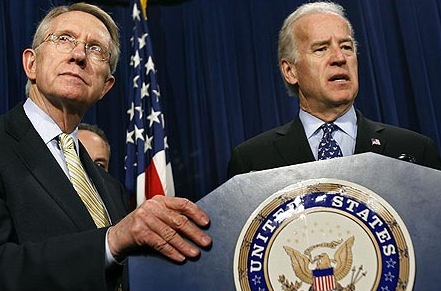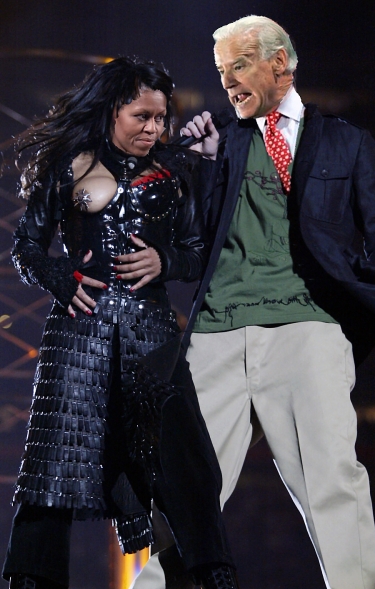CGI's oldBuck: Top Secret America - The Secrets Right Next
Door!
|
In suburbs across the nation, the intelligence
community goes about its anonymous business. Its work isn’t seen, but its
impact is surely felt. The brick warehouse is not just a warehouse. Drive through the gate and around back, and there, hidden away, is someone's personal security detail: a fleet of black SUVs that have been armored up to withstand explosions and gunfire. Along the main street, the signs in the median aren't advertising homes for sale; they're inviting employees with top-secret security clearances to a job fair at Cafe Joe, which is anything but a typical lunch spot. The new gunmetal-colored office building is really a kind of hotel where businesses can rent eavesdrop-proof rooms. Even the manhole cover between two low-slung buildings is not just a manhole cover. Surrounded by concrete cylinders, it is an access point to a government cable. "TS/SCI," whispers an official, the abbreviations for "top secret" and "sensitive compartmented information" - and that means few people are allowed to know what information the cable transmits. All of these places exist just outside Washington in what amounts to the capital of an alternative geography of the United States, one defined by the concentration of top-secret government organizations and the companies that do work for them. This Fort Meade cluster is the largest of a dozen such clusters across the United States that are the nerve centers of Top Secret America and its 854,000 workers. Other locations include Dulles-Chantilly, Denver-Aurora and Tampa. All of them are under-the-radar versions of traditional military towns: economically dependent on the federal budget and culturally defined by their unique work. The difference, of course, is that the military is not a secret culture. In the clusters of Top Secret America, a company lanyard attached to a digital smart card is often the only clue to a job location. Work is not discussed. Neither are deployments. Debate about the role of intelligence in protecting the country occurs only when something goes wrong and the government investigates, or when an unauthorized disclosure of classified information turns into news. The existence of these clusters is so little known that most people don't realize when they're nearing the epicenter of Fort Meade's, even when the GPS on their car dashboard suddenly begins giving incorrect directions, trapping the driver in a series of U-turns, because the government is jamming all nearby signals. Once this happens, it means that ground zero - the National Security Agency - is close by. But it's not easy to tell where. Trees, walls and a sloping landscape obscure the NSA's presence from most vantage points, and concrete barriers, fortified guard posts and warning signs stop those without authorization from entering the grounds of the largest intelligence agency in the United States. Beyond all those obstacles loom huge buildings with row after row of opaque, blast-resistant windows, and behind those are an estimated 30,000 people, many of them reading, listening to and analyzing an endless flood of intercepted conversations 24 hours a day, seven days a week. From the road, it's impossible to tell how large the NSA has become, even though its buildings occupy 6.3 million square feet - about the size of the Pentagon - and are surrounded by 112 acres of parking spaces. As massive as that might seem, documents indicate that the NSA is only going to get bigger: 10,000 more workers over the next 15 years; $2 billion to pay for just the first phase of expansion; an overall increase in size that will bring its building space throughout the Fort Meade cluster to nearly 14 million square feet. The NSA headquarters sits on the Fort Meade Army base, which hosts 80 government tenants in all, including several large intelligence organizations. Together, they inject $10 billion from paychecks and contracts into the region's economy every year - a figure that helps explain the rest of the Fort Meade cluster, which fans out about 10 miles in every direction. ---- Just beyond the NSA perimeter, the companies that thrive off the agency and other nearby intelligence organizations begin. In some parts of the cluster, they occupy entire neighborhoods. In others, they make up mile-long business parks connected to the NSA campus by a private roadway guarded by forbidding yellow "Warning" signs. The largest of these is the National Business Park - 285 tucked-away acres of wide, angular glass towers that go on for blocks. The occupants of these buildings are contractors, and in their more publicly known locations, they purposely understate their presence. But in the National Business Park, a place where only other contractors would have reason to go, their office signs are huge, glowing at night in bright red, yellow and blue: Booz Allen Hamilton, L-3 Communications, CSC, Northrop Grumman, General Dynamics, SAIC. More than 250 companies - 13 percent of all the firms in Top Secret America - have a presence in the Fort Meade cluster. Some have multiple offices, such as Northrop Grumman, which has 19, and SAIC, which has 11. In all, there are 681 locations in the Fort Meade cluster where businesses conduct top-secret work. Inside the locations are employees who must submit to strict, intrusive rules. They take lie-detector tests routinely, sign nondisclosure forms and file lengthy reports whenever they travel overseas. They are coached on how to deal with nosy neighbors and curious friends. Some are trained to assume false identities. If they drink too much, borrow too much money or socialize with citizens from certain countries, they can lose their security clearances, and a clearance is the passport to a job for life at the NSA and its sister intelligence organizations. The role of private contractors As Top Secret America has grown, the government has become more dependent on contractors with matching security clearances. Launch Photo Gallery » Chances are they excel at math: To do what it does, the NSA relies on the largest number of mathematicians in the world. It needs linguists and technology experts, as well as cryptologists, known as "crippies." Many know themselves as ISTJ, which stands for "Introverted with Sensing, Thinking and Judging," a basket of personality traits identified on the Myers-Briggs personality test and prevalent in the Fort Meade cluster. The old joke: "How can you tell the extrovert at NSA? He's the one looking at someone else's shoes." "These are some of the most brilliant people in the world," said Ken Ulman, executive of Howard County, one of six counties in NSA's geographic sphere of influence. "They demand good schools and a high quality of life." The schools, indeed, are among the best, and some are adopting a curriculum this fall that will teach students as young as 10 what kind of lifestyle it takes to get a security clearance and what kind of behavior would disqualify them. Outside one school is the jarring sight of yellow school buses lined up across from a building where personnel from the "Five Eye" allies - the United States, Britain, Canada, Australia and New Zealand - share top-secret information about the entire world. The buses deliver children to neighborhoods that are among the wealthiest in the country; affluence is another attribute of Top Secret America. Six of the 10 richest counties in the United States, according to Census Bureau data, are in these clusters. Loudoun County, ranked as the wealthiest county in the country, helps supply the workforce of the nearby National Reconnaissance Office headquarters, which manages spy satellites. Fairfax County, the second-wealthiest, is home to the NRO, the CIA and the Office of the Director of National Intelligence. Arlington County, ranked ninth, hosts the Pentagon and major intelligence agencies. Montgomery County, ranked 10th, is home to the National Geospatial-Intellig ence Agency. And Howard County, ranked third, is home to 8,000 NSA employees. "If this were a Chrysler plant, we'd be talking Chrysler in the bowling alley, Chrysler in the council meetings, Chrysler, Chrysler, Chrysler," said Kent Menser, a Defense Department employee helping Howard County adjust to the growth of nearby Fort Meade. "People who are not in the workforce of NSA don't fully appreciate the impact of it on their lives." ---- The impact of the NSA and other secretive organizations in this cluster is not just monetary. It shades even the flow of traffic one particular day as a white van pulls out of a parking lot and into midday traffic. That white van is followed by five others just like it. Inside each one, two government agents in training at the secretive Joint Counterintelligence Training Academy are trying not to get lost as they careen around local roads practicing "discreet surveillance" - in this case, following a teacher in the role of a spy. The real job of these agents from the Army, U.S. Customs and other government agencies is to identify foreign spies and terrorists targeting their organizations, to locate the spies within and to gather evidence to take action against them. But on this day, they are trainees connected to one another by radios and specially labeled street maps. Some 4,000 federal and military agents attend counterintelligence classes in the Fort Meade cluster every year, moving, as these agents are, past unsuspecting residents going about their business. The agent riding shotgun in one white van holds the maps on her lap as she frantically moves yellow stickies around, trying to keep tabs on the other vans and the suspect, or "rabbit," as he is called. Other agents gun their engines and race 60 mph, trying to keep up with the rabbit while alerting one another to the presence of local police, who don't know that the vans weaving in and out of traffic are driven by federal agents. Suddenly, the rabbit moves a full block ahead of the closest van, passes through a yellow light, then drives out of sight as the agents get stuck at a red light. Green light. "Go!" an agent yells in vain through the windshield as the light changes an of the NSA's workforce is active-du "Move! Move! Move!" "We lost him," her partner groans as they do their best to catch up. Finally, the agents end their surveillance on foot at a Borders bookstore in Columbia where the rabbit has reappeared. Six men in polo shirts and various shades of khaki pants scan the magazine racks and slowly walk the aisles. Their instructor cringes. "The hardest part is the demeanor," he confides, watching as the agents follow the rabbit in the store, filled with women in shifts and children in flip-flops. "Some of them just can't relax enough to get the demeanor right. . . . They should be acting like they're browsing, but they are looking over the top of a book and never move." Throughout the cluster are examples of how the hidden world and the public one intersect. A Quiznos sandwich shop in the cluster has the familiarity of any other restaurant in the national chain, except for the line that begins forming at 11 a.m. Those waiting wear the Oakley sunglasses favored by people who have worked in Afghanistan or Iraq. Their shoes are boots, the color of desert sand. Forty percent of the NSA's workforce is active-duty military, and this Quiznos is not far away from one of their work sites. Bill Brown, left, and Jerome James tend to James's property in suburban Maryland, which abuts a secure building. (Photo by Bonnie Jo Mount / The Washington Post) | Launch Photo Gallery » In another part of the cluster, Jerome James, one of its residents, is talking about the building that has sprung up just beyond his back yard. "It used to be all farmland, then they just started digging one day," he says. "I don't know what they do up there, but it doesn't bother me. I don't worry about it." The building, sealed off behind fencing and Jersey barriers, is larger than a football field. It has no identifying sign. It does have an address, but Google Maps doesn't recognize it. Type it in, and another address is displayed, every time. "6700," it says. No street name. Just 6700. ---- Inside such a building might be Justin Walsh, who spends hours each day on a ladder, peering into the false ceilings of the largest companies in Top Secret America. Walsh is a Defense Department industrial security specialist, and every cluster has a version of him, whether it's Fort Meade; or the underground maze of buildings at Crystal City in Arlington, near the Pentagon; or the high-tech business parks around the National Aerospace Intelligence Center in Dayton, Ohio. When he's not on his ladder, Walsh is tinkering with a copy machine to make sure it cannot reproduce the secrets stored in its memory. He's testing the degausser, a giant magnet that erases data from classified hard drives. He's dissecting the alarm system, its fiber-optic cable and the encryption it uses to send signals to the control room. The government regulates everything in Top Secret America: the gauge of steel in a fence, the grade of paper bag to haul away classified documents, the thickness of walls and the height of raised soundproof floors. In the Washington area, there are 4,000 corporate offices that handle classified information, 25 percent more than last year, according to Walsh's supervisor, and on any given day Walsh's team has 220 buildings in its inspection pipeline. All existing buildings have things that need to be checked, and the new buildings have to be gone over from top to bottom before the NSA will allow their occupants to even connect to the agency via telephone. Soon, there will be one more in the Fort Meade cluster: a new, four-story building, going up near a quiet gated community of upscale townhouses, that its builder boasts can withstand a car bomb. Dennis Lane says his engineers have drilled more bolts into each steel beam than is the norm to make the structure less likely to buckle were the unthinkable to happen. Lane, senior vice president of Ryan Commercial real estate, has become something of a snoop himself when it comes to the NSA. At 55, he has lived and worked in its shadow all his life and has schooled himself on its growing presence in his community. He collects business intelligence using his own network of informants, executives like himself hoping to making a killing off an organization many of his neighbors don't know a thing about. He notices when the NSA or a different secretive government organization leases another building, hires more contractors and expands its outreach to the local business community. He's been following construction projects, job migrations, corporate moves. He knows that local planners are estimating that 10,000 more jobs will come with an expanded NSA and an additional 52,000 from other intelligence units moving to the Fort Meade post. Lane was up on all the gossip months before it the terrorist attacks has grown into an unwieldy enterprise spread over 10,000 U.S. locations. Launch Photo Gallery » Undercover agents come in :p> Lane knows this because he has witnessed the post-9/11 growth of the NSA, which now ingests 1.7 billion pieces of intercepted communications every 24 hours: e-mails, bulletin board postings, instant messages, IP addresses, phone numbers, telephone calls and cellphone conversations. In her own way, Jeani Burns has witnessed this, too. Burns, a businesswoman in the Fort Meade cluster, is having a drink one night after work and gesturing toward some men standing in another part of the bar. "I can spot them," she says. The suit. The haircut. The demeanor. "They have a haunted look, like they're afraid someone is going to ask them something about themselves." An alternative geography Since Sept. 11, 2001, the top-secret world created to respond to the terrorist attacks has grown into an unwieldy enterprise spread over 10,000 U.S. locations. Launch Photo Gallery » Undercover agents come in here, too, she whispers, to watch the same people, "to make sure no one is saying too much." Burns would know - she's been living with one of those secretive men for 20 years. He used to work at the NSA. Now he's one of its contractors. He's been to war. She doesn't know where. He does something important. She doesn't know what. She says she fell for him two decades ago and has had a life of adjustments ever since. When they go out with other people, she says, she calls ahead with cautions: "Don't ask him stuffinside the NSA, the mathematicians, the linguists, the techies and the crippies are flowing in and out. The ones leaving descend in elevators to the first floor. Each is carrying a plastic bar-coded box. Inside is a door key that rattles as they walk. To those who work here, it's the sound of a shift change. As employees just starting their shifts push the turnstiles forward, those who are leaving push their identity badges into the mouth of the key machine. A door opens. They drop their key box in, then go out through the turnstiles. They drive out slowly through the barriers and gates protecting the NSA, passing a steady stream of cars headed in. It's almost ional Business Park, office lights remain on here and there. The 140-room Marriott Courtyard is sold out, as usual, with guests such as the man checking in who says only that he's "with the military." Anti-Deception Technologies From avatars and lasers to thermal cameras and fidget meters, this multimedia gallery takes a look at some of the latest technologies being developed by the government and private companies to thwart terrorists. Launch Gallery » And inside the NSA, the mathematicians, the linguists, the techies and the crippies are flowing in and out. The ones leaving descend in elevators to the first floor. Each is carrying a plastic bar-coded box. Inside is a door key that rattles as they walk. To those who work here, it's the sound of a shift change. As employees just starting their shifts push the turnstiles forward, those who are leaving push their identity badges into the mouth of the key machine. A door opens. They drop their key box in, then go out through the turnstiles. They drive out slowly through the barriers and gates protecting the NSA, passing a steady stream of cars headed in. It's almost midnight in the Fort Meade cluster, the capital of Top Secret America, a sleepless place growing larger every day. Staff researcher Julie Tate contributed to this story. Correction: Jerome James was initially named incorrectly in this story as Jerome Jones http://www.freedomfightersforamerica.com/top_secret_america |









